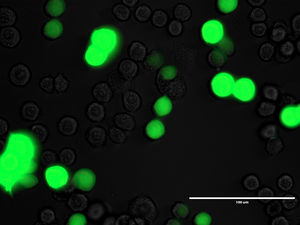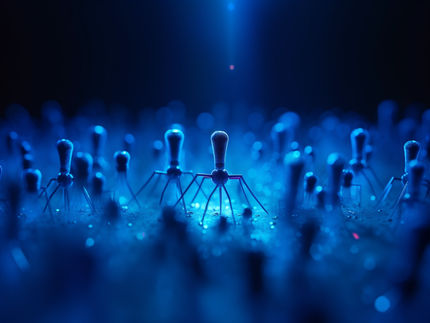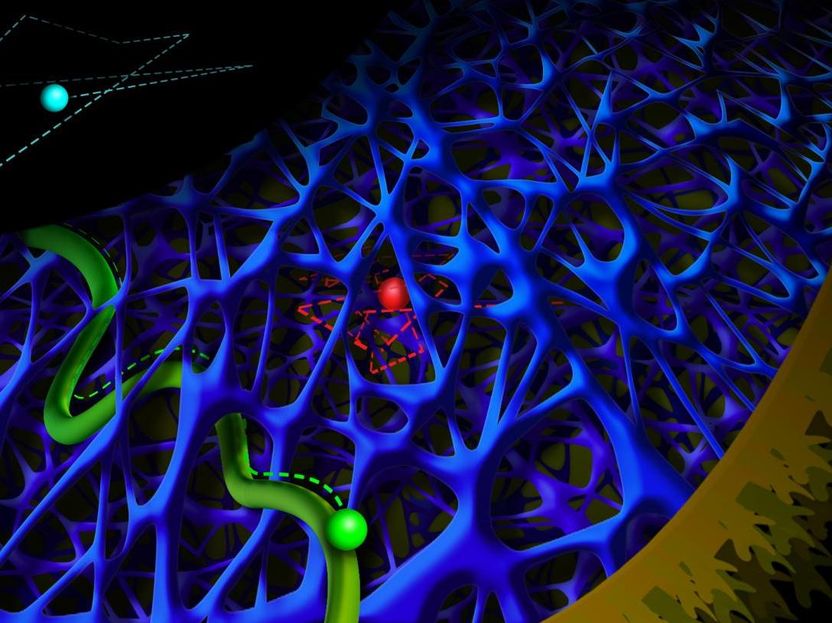Protein production made easier
Researchers significantly improved a method for the production of complex proteins
Advertisement
proteins are involved in all vital processes in the body. In infections, they assume a range of crucial functions, not only during the penetration of the pathogen, but also in the body's defence. To be able to research proteins and to utilise them specifically for therapeutic purposes, it is necessary to have large amounts of these proteins available in pure form. Scientists of the Helmholtz Centre for Infection Research (HZI) in Braunschweig recently improved one of the most common protein production methods - the insect cell-based baculovirus expression vector system (BEVS) - to simplify and accelerate the production process.

Insect cells that produce the protein SplitGFP (green).
HZI/Bleckmann
The modern way of specifically producing proteins and equipping them with certain function is by artificial means. Scientists use genetically engineered modified microorganisms or cell cultures to produce these so-called recombinant proteins. "One of the production systems is the BEV system, which is based on a baculovirus in combination with insect cells," says Dr Joop van den Heuvel, who is the director of the "Recombinant Protein Expression" research group at the HZI. "Although this method affords high yields, the quality of the protein suffers somewhat during the production process and the method is very time-consuming and laborious."
Van den Heuvel and his colleagues just succeeded in improving the method to make it work quicker and better. The decisive step was to recognise more quickly which proteins are deserving of further development. "The time-consuming step of BEVS is that there is a large number of constructs that need to be tested to filter out how proteins are produced successfully," says Maren Bleckmann, who is a doctoral student in the "Recombinant Protein Expression" research. "We improved this step by introducing a new system. This allows us to colour-code the successful synthesis of the proteins of interest." Accordingly, it can be determined more rapidly which proteins are deserving of further development.
The scientists thus took the first step towards staying ahead of the ever-increasing requirements faced during the production of recombinant proteins in insect cells. These proteins are used mainly for crystallisation and vaccine production. "The effect of vaccines from insect cells is more efficient than that of conventional vaccines made from hen's eggs. In the long term, the improvement of the method allows us to produce more efficient vaccines both faster and better," says Bleckmann.
Original publication
Maren Bleckmann*, Margitta Schürig*, Fang-Fang Chen, Zen-Zen Yen, Nils Lindemann, Steffen Meyer, Johannes Spehr, Joop van den Heuvel (*authors contributed equally to this work); “Identification of essential genetic baculoviral elements for recombinant protein expression by transactivation in Sf21 insect cells”; PLOS ONE; PMID: 26934632
Maren Bleckmann, Stefan Schmelz, Christian Schinkowski, Andrea Scrima, Joop van den Heuvel; “Fast plasmid based protein expression analysis in insect cells using an automated SplitGFP screen”; Biotechnology and Bioengineering; PMID: 26913471
Maren Bleckmann, Markus H.-Y. Fritz, Sabin Bhuju, Michael Jarek, Margitta Schürig, Robert Geffers, Vladimir Benes, Hüseyin Besir, Joop van den Heuvel; “Genomic analysis and isolation of RNA polymerase II dependent promoters from Spodoptera frugiperda”; PLOS ONE; PMID: 26263512, 2015.























































